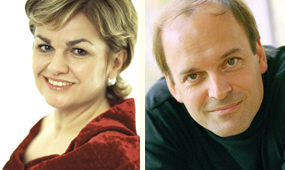

 |
 |
|
| Wagner, Liszt and the Romantic Tradition  Susan Bullock - soprano Susan Bullock - sopranoLouis Lortie piano Wigmore Hall 12 April 2006
Liszt: Der Fischeknabe S 292; Im Rhein, im schonen Strome S 272; Mignons Lied (Kennst du das Land ) S 275; Der du von dem Himmel bist S 279; Die drei Zigeuner: Nuages gris S 199; RW Venezia S201: Enfant, si j'etais roi S 283; Comment, disaient-ils? S276; S'il est un charmant gazon S 285; Oh! Quand je dors S 282
We don't hear Liszt's songs as often as we should. True, there's a sense of indulgence about them, particularly in the piano accompaniments, which Liszt recognised and in most instances revised. With a pianist on the platform of the calibre of Louis Lortie this scintillating music really comes into its own and it was appropriate that, at least for two of the songs ( Der du von dem Himmel bist and S'il est un charmant gazon ), e were treated to the unabridged original versions.
Liszt turns each of his songs into a miniature drama and Susan Bullock is a singer who really gets to the heart of the narrative, drawing out the storyline in voice and gesture. In the three verses of Kennst du das Land she led us in turn through the fragrant woodland groves, into the mansion with its columns and statues, and finally along the dangerous mountain pathway between sheer cliffs and dragons' lair. She also brought to life The three gypsies variously playing the fiddle, smoking or sleeping whilst the breeze swept over the strings of his cimbalom.
Her second group of songs were all settings of Victor Hugo, even more redolent of the Romantic age If there be a dream of love with the scent of roses wonderful tone poems for voice and piano.
There was better still to come, as this was a recital which really blossomed in the second half.
It started with Liszt's virtuoso transcription for piano solo of Wagner's great Liebestod. Without sentimentalising it in any way, Lortie created a huge tide of passion which was almost overwhelming in the long final chord.
Such music seemed almost impossible to follow, but there was a natural progression to the Wesendonk Lieder in which Susan Bullock showed us why she is in so much demand internationally as a Wagnerian. She seemed totally at one with the music as her voice surged through it they say each composer demands his own voice colouring, and here it was a searing translucence a truly outstanding performance.
Serena Fenwick
|